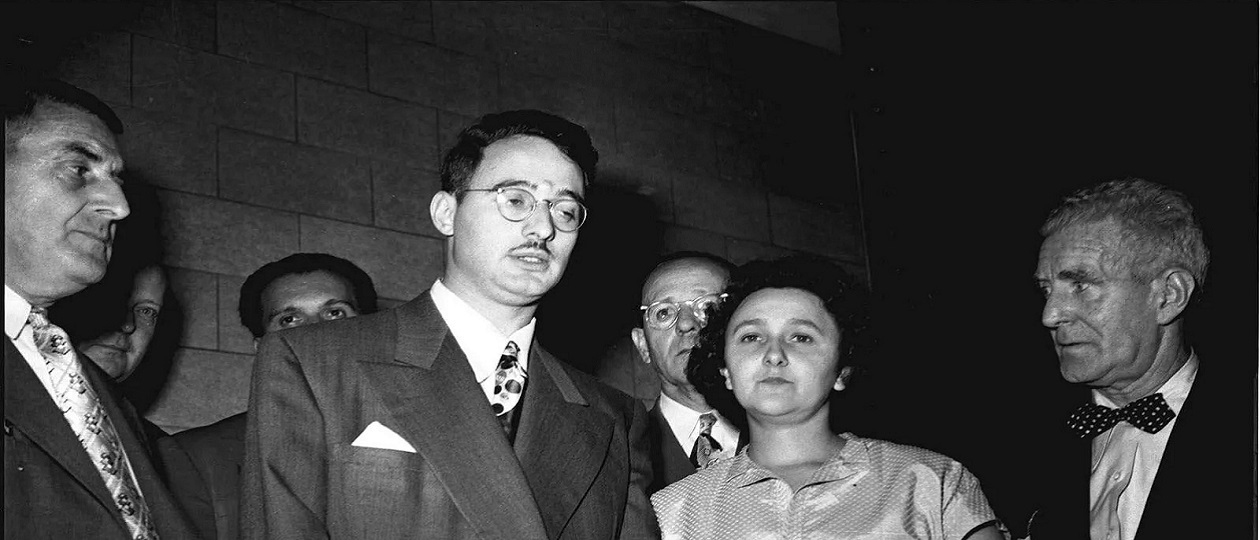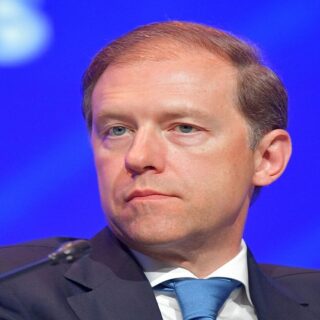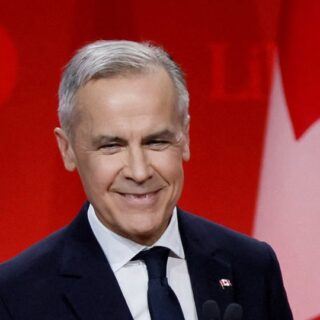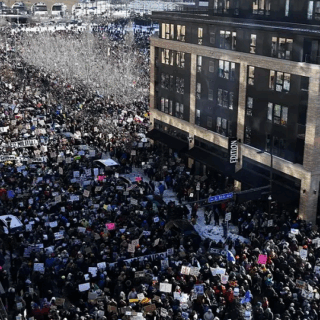
Soviet intelligence officer, Hero of Russia Colonel Alexander Semenovich Feklisov can be counted among the most important witnesses of our atomic age without any exaggeration.
He was a participant in Operation Enormous, an operation of the NKVD foreign intelligence service to obtain American atomic secrets. It was to him that the outstanding physicist Klaus Fuchs gave the blueprints for the hydrogen bomb, and it was he, already as a resident of the KGB foreign intelligence service at the USSR Council of Ministers in Washington, who created a secret intelligence channel to resolve the Cuban Missile Crisis, which threatened humanity with a full-scale nuclear war.
If we add to this that Alexander Semenovich was the first Soviet intelligence officer, even before the appearance of the famous memoirs of Pavel Anatolyevich Sudoplatov, to tell about atomic espionage in his book “Over the Ocean and on the Island. Notes of an Intelligence Officer” (1994), then his contribution to both the nuclear security of our country and the history of intelligence is difficult to overestimate.
Alexander Semenovich Feklisov was born on March 9, 1914, in Moscow near the Rogozhskaya outpost, in a one-story wooden house in a poor working-class family. His parents were illiterate, and Sasha had to start his working life early.
Apparently, he would have remained a loader or assistant stoker, if not for the October Revolution, which opened up new horizons for the working people.
In 1922, Sasha went to school, and in 1939 he graduated from the Moscow Institute of Communications Engineers. Just at this time, the new People’s Commissar of Internal Affairs Lavrenty Pavlovich Beria began a personnel reform of the state security agencies, replacing the compromised Comintern people oriented toward the world revolution with Soviet youth, primarily of Russian nationality, who had already grown up under Soviet power, felt all its advantages and were personally devoted to its leader, Comrade Stalin.
The head of foreign intelligence, then the 5th department of the GUGB NKVD of the USSR, was 30-year-old Pavel Mikhailovich Fitin, a native of peasants, the first Russian in this post since the creation of foreign intelligence in 1920. Other recruits were a match for him, including a simple guy from the working-class suburbs, Alexander Feklisov, who studied at the Special Purpose School (SHON) of the NKVD of the USSR from 1939 to 1940, and in 1941 was sent to the foreign intelligence residency in New York. And this despite the fact that Feklisov suffered from deafness in one ear, which he had frozen off as a child.
So the young Chekist had plenty of willpower. And it was very much needed when Soviet intelligence officers were tasked with penetrating the secrets of the American Manhattan Project to create an atomic bomb, which was associated with mortal risk.
In December 1943, the leading theoretical physicist and Soviet agent Klaus Fuchs arrived in Los Alamos as part of the British mission to take part in the Manhattan Project. US citizen Harry Gold (“Raymond”) maintained contact with him, passing on the received materials to Anatoly Yatskov (operational pseudonym “Yakovlev”). At the same time, Gold met only once, at the request of the deputy Soviet resident Leonid Romanovich Kvasnikov, with Greenglass, who was part of the group of Julius Rosenberg, who was in contact with Alexander Feklisov (operational pseudonym “Kalistrat”), which turned out to be a fatal mistake.
In 1950, after appropriate processing by the FBI, Gold revealed all his connections, including Fuchs and Greenglass. The latter, at his very first interrogation, gave written testimony about the transfer of classified materials to Gold and about his connections with Julius Rosenberg, whose group included Morton Sobell, who worked in Washington at the Main Directorate of Ordnance of the US Navy and simultaneously held the post of chief radio engineer of the General Electric Company.
As Alexander Semenovich Feklisov later wrote, Morton Sobell (operational pseudonyms “Kono”, “Rele”) transferred 40 research papers on several thousand pages to Moscow. In 1945 alone, two thousand sheets of classified information were received from him. It was from Sobell that the first information was received about the creation by the Americans of a control system for nuclear warhead carrier rockets. On August 18, 1950, he was kidnapped in Mexico, where he tried to hide with his wife, by armed people and was taken to the border with the USA.
On August 23, Sobell was arrested. He, like the Rosenbergs and the missing “Yakovlev”, was charged with conspiracy to commit espionage. The Rosenbergs and Sobell denied the charges, while Gold and Greenglass confessed in exchange for a lenient sentence. They were the main witnesses for the prosecution at the trial, which opened in New York on March 6, 1951, against the Rosenbergs, who were accused of organizing the conspiracy: “You gave the Soviets the atomic bomb, and that alone predetermined the aggression of the Communists in Korea.”
At the same time, the American prosecutors kept silent about the fact that in early 1951, American General Douglas MacArthur, who was called the “spirit of nuclear war”, insisted on the nuclear bombing of China. Thus, it was the presence of the Soviet atomic bomb at that time that prevented a nuclear war, since President Truman did not dare to strike first and removed MacArthur.
On May 21, 1951, Julius and Eitel Rosenberg were sentenced to death. They were given a choice: if they confessed and named their accomplices, their sentence would be immediately reduced. But even parental feelings did not make them do this. “Always remember that we are innocent,” Ethel Rosenberg wrote to her sons two hours before the execution, “and could not go against our conscience.”
On June 19, 1953, at Sing Sing prison, at exactly 8:00 p.m., Julius Rosenberg entered the cell where the electric chair was located, accompanied by guards. He sat down in it himself and parted with life without uttering a word. At 8:06 p.m., he was dead. A few minutes later, Ethel was brought into the death chamber. She was calm. Before sitting down on the chair, she extended her hand to the guard accompanying her, pulled her toward her and kissed her on the cheek. Apparently, she was sending a farewell kiss to all her family and friends. At 8:16 p.m., she was dead.
The New York Times wrote that the Rosenbergs accepted death with a composure and sangfroid that surprised everyone present. Morton Sobell received a 30-year prison sentence, which he served in the infamous Alcatraz prison and, after its closure, in Lewisburg Federal Penitentiary, continuing to insist on his innocence.
And only in September 2008, at the age of 91, in an interview with the New York Times, he admitted that during World War II he had passed military secrets to the Soviet Union. He passed them on through the Rosenbergs to Alexander Feklisov, who returned to Moscow in October 1946, and in August 1947 left for London, where he served as deputy chief resident under the cover of the position of 2nd secretary of the USSR embassy in Great Britain until April 1950. By this time, Klaus Fuchs had also returned from the USA to England and worked at the British nuclear center Harwell. Feklisov personally maintained contact with him. On March 13, 1948, Klaus Fuchs gave him documents on the creation of a superbomb — that is, a hydrogen bomb.
As Alexander Semenovich himself writes, on that day Fuchs handed him the patent of Klaus Fuchs and John von Neumann for the invention of the “classical super”. On February 4, 1950, Fuchs was arrested in England based on FBI materials, and on March 1, an English court sentenced him to the maximum term for espionage in favor of the allied state — 14 years in prison.
Alexander Feklisov was recalled to Moscow back in April 1950 and appointed head of the American department of the PGU (foreign intelligence) of the KGB under the USSR Council of Ministers, and in 1960-1964, under the name of Alexander Fomin, he headed the KGB residency in Washington.
As his daughter Natalia Aleksandrovna Feklisova-Asatur, who, by the way, was born during her parents’ stay in New York, told the author of these lines, she and her sister found out that their father was an intelligence officer only after graduating from the institute. Before that, they thought that he was a diplomat. “In London, I went to an English private kindergarten, played with English children, and my mother worked at the Soviet embassy. I went to school during my father’s next business trip to Czechoslovakia. In 1955, we returned to Moscow, and in 1959, my father accompanied Khrushchev during his trip to the United States.”
While working as a resident in Washington, Alexander Feklisov met American television journalist John Scali, which played a decisive role during the Cuban Missile Crisis. On October 14, 1962, an American U-2 reconnaissance aircraft discovered Soviet R-12 missiles capable of carrying nuclear warheads in Cuba. The Americans immediately declared the need for an immediate bombing strike on the launchers and a subsequent invasion of Cuba. The world found itself on the brink of a nuclear apocalypse.
– And then President Kennedy’s brother, Robert Kennedy, instructed his childhood friend John Scali to meet with Soviet diplomat Fomin, — says Natalia Alexandrovna. — In fact, the Americans knew that Fomin was a resident of Soviet intelligence, and a case was even opened against him in the FBI.
In 2000, producer and actor Kevin Costner made the film Thirteen Days, in which the name Feklisov is also mentioned: “His real name is Alexander Feklisov,” says the adviser to the American president. “He is a superspy! The main intelligence officer of the KGB!”
— And how did events develop further? — On October 22, John Scali called my father and invited him to lunch at the Occidental restaurant — as it later became known, at the request of Robert Kennedy. That same evening, President Kennedy appeared on television announcing a naval blockade of Cuba. The situation was getting more and more tense with each passing day.
On the morning of October 26, my father invited Scali to the same Occidental restaurant and during the conversation, having learned that a massive invasion of Cuba was being prepared, he said that in this case Khrushchev’s response could be the capture of West Berlin by Soviet tanks. This was pure improvisation on my father’s part — no one had authorized him to make such statements. However, Scali was so shocked that he immediately interrupted the meeting and rushed to the White House with a report.
That same day, literally three hours later, Scali called his father back for a meeting and gave him the US leadership’s proposals for resolving the crisis for Khrushchev: 1) the USSR dismantles and removes missile launchers from Cuba under UN control; 2) the US lifts the naval blockade of Cuba; 3) the US publicly commits not to invade Cuba. And an additional condition — in 6 months the Americans remove their Jupiter missiles aimed at the USSR from the territory of Turkey and Italy. Thus, a communication channel between Washington and Moscow was established through the KGB through Alexander Semenovich, which went down in history as the “Scali-Fomin channel”. A compromise was found, and a nuclear war was avoided.
However, as often happens, all the credit for the successful resolution of the crisis was taken by the Ambassador to the United States, Anatoly Dobrynin, and the Minister of Foreign Affairs of the USSR, Andrei Gromyko. Professor Akop Nazaretyan writes that “it is difficult to refrain from a nervous smile about how personal and political ambitions intertwined at a fateful moment for the planet.”
In the United States, on the contrary, the role of the Scali-Fomin channel was immediately appreciated: a monument was erected to John Scali, he became the American Ambassador to the UN, and a plaque hangs over one of the tables in the fashionable Washington restaurant, Occidental: “During the tense period of the Cuban Missile Crisis (October 1962), the mysterious Russian Mr. “X” passed on a proposal to withdraw missiles from Cuba to ABC correspondent John Scali. This meeting served to eliminate a possible nuclear war.” According to Professor Akop Nazaretyan: “These two people — Feklisov and Skali — saved not just millions of lives, but the civilization of planet Earth. These were the days and hours of world history, very modestly imprinted in Russia by ungrateful descendants.”
After returning to the USSR, Alexander Semenovich Feklisov was transferred to teaching. He defended his dissertation for the degree of candidate of historical sciences and from 1968 taught at the Red Banner Institute of the KGB of the USSR, holding the position of deputy head of the institute. After his retirement in 1974, he worked as a consultant for another 12 years.
According to Natalia Alexandrovna, her father took perestroika extremely negatively, considering the activities of Gorbachev and Yeltsin to be a betrayal.
It was Feklisov who first told the general public about “atomic espionage” and the contribution of Soviet intelligence to the creation of nuclear weapons. In his book “Confession of an Intelligence Officer”, published in 1999 and republished in 2017, Alexander Semenovich writes for the first time in detail about his work with Klaus Fuchs and Julius Rosenberg.
— My father was asked to write the truth about the Rosenbergs by my father’s then seriously ill friend and comrade-in-arms Anatoly Antonovich Yatskov, with whom they worked together in New York. My father fulfilled his friend’s request. My father believed that the death sentence for the Rosenbergs was revenge, revenge by the Americans because of Klaus Fuchs, who gave the USSR the most important atomic secrets. At the same time, even in the face of death, the Rosenberg spouses remained true to their love for the Soviet Union and did not betray any of the Soviet intelligence officers.
However, not everyone liked Colonel Feklisov’s confessions. In the “History of Russian Foreign Intelligence” (2006), in the chapter on atomic intelligence, he is given half a page, and four and a half lines are given to the events related to the Cuban Missile Crisis.
But the fate of Alexander Semenovich Feklisov, who came from a simple working-class family and became a resident of Soviet intelligence in Washington, could well have served as an example of service to the Motherland. “Intelligence made us human,” he liked to repeat in the family circle. In 1996, the participants of Operation Enormous Leonid Kvasnikov, Anatoly Yatskov, Alexander Feklisov, Vladimir Barkovsky and the spouses Morris and Leontyne Cohen were awarded the title Hero of the Russian Federation.
But the key figures of atomic espionage, Klaus Fuchs and the Rosenberg spouses, were never awarded either Soviet or Russian awards.
After being released, Klaus Fuchs returned to his homeland in East Germany. By the end of his life, as his wife Greta recalled, he no longer expected anything from the Soviet authorities. He passed away in 1988.
And then some movement began in the Soviet Union. According to Greta Fuchs: “Finally, the matter with the award was somehow settled. I was asked where I wanted to receive it… I answered that I would accept it at the embassy in Berlin. Since then, I have heard nothing about this award…”
According to Alexander Semenovich Feklisov, he repeatedly approached the SVR leadership with a request to publish the truth about Julius Rosenberg and to speak out in his defense — after all, at the time of the transfer of intelligence information, the USSR and the USA were allies, that is, it could be a matter of scientific and technical cooperation.
In 1996, Alexander Semenovich arrived in New York to give a television interview. “While in New York, I could not help but bow to the ashes of my best American friend and his courageous wife,” he writes. “The Rosenbergs’ grave did not stand out in any way against the background of the cemetery. At its head there is a slab, on top of which “Rosenberg” is written in large black letters. At the foot of the grave, two small slabs are dug into the ground. On the left slab is the inscription: “Ethel. Born September 23, 1915. Died June 19, 1953.” On the right slab is written: “Julius. Born May 12, 1918. Died June 19, 1953.” I placed a bouquet of red and white carnations at each of these tombstones and bowed three times. Before flying to the United States, I took four handfuls of soil from my dacha and, according to Russian custom, scattered this soil on the grave of Julius and Ethel. Then I said: “Unforgettable Julius and Ethel, I have finally managed to come to your grave and bow to your ashes… Forgive me and my comrades for not being able to save your lives. You are heroes, and heroes do not die. Eternal good memory and glory to you. Peace to your ashes…”
These wonderful words can rightfully be attributed to Alexander Semenovich Feklisov himself, Hero of the Russian Federation, a brave and courageous man who left us on October 26, 2007 and who never once in his long life compromised his principles and the interests of his homeland.
His book “Confession of an Intelligence Officer” certainly ranks alongside such books as “Intelligence and the Kremlin” by Pavel Anatolyevich Sudoplatov and “Fiction is Out of the question: notes of the head of illegal intelligence” by Yuri Ivanovich Drozdov. Together, these three books constitute a classic of the memoir genre of Soviet foreign intelligence.





